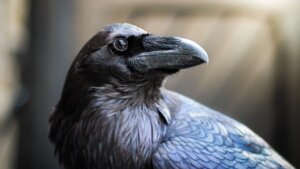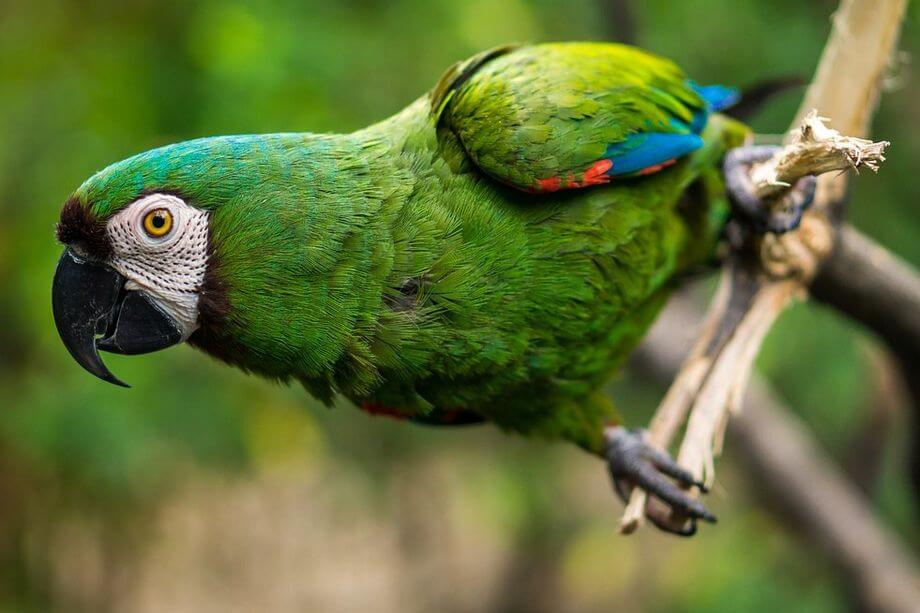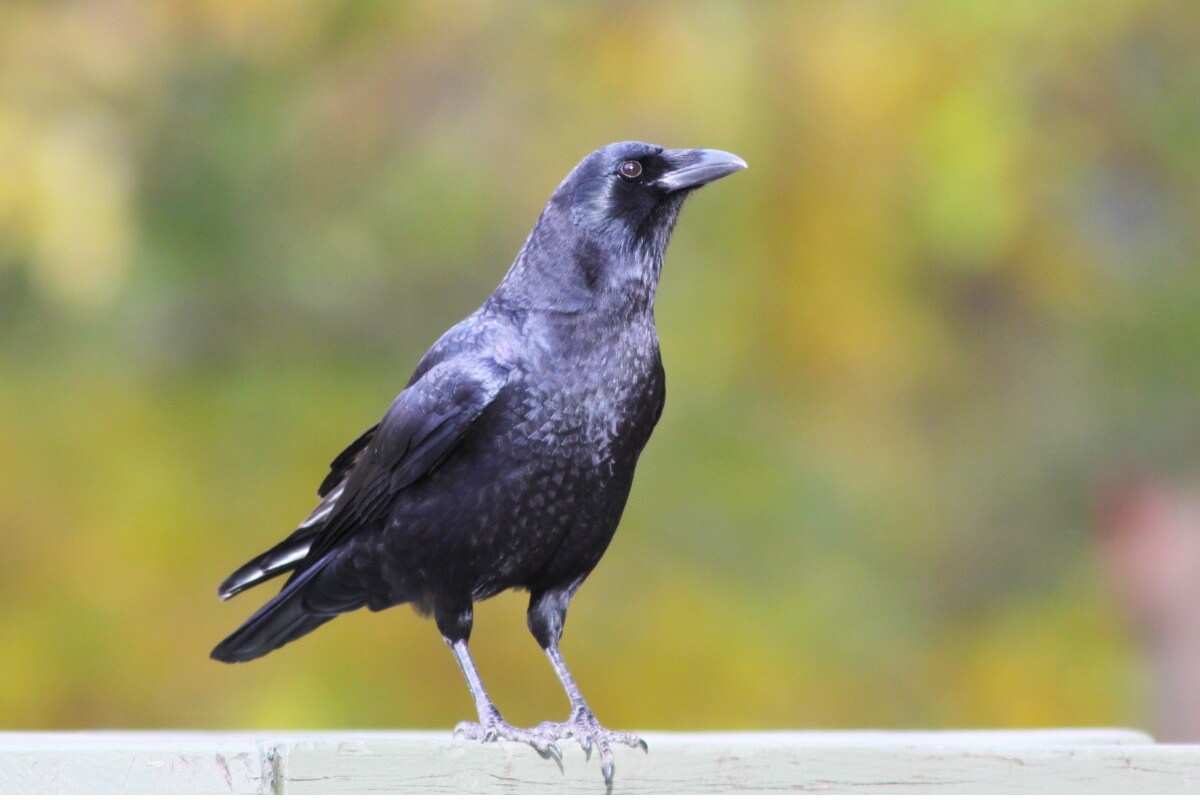Birds Can Think Logically


Written and verified by the veterinarian and zootechnician Sebastian Ramirez Ocampo
For a long time, researchers dedicated to the study of birds have wondered how it’s possible that these animals, having such small brains, manage to perform such complex tasks. Find out how birds think logically in this fascinating article!
To mention just one example, crows have a rather ingenious way of opening nuts. Unable to open them with their beaks, those that live near cities perch on traffic lights to drop them. Once the cars have passed over them and the light turns red, the little crows descend to get the reward of their ingenuity.
Like this, there are several complex behaviors that birds manifest in different environments. Thanks to advances in technology, it has been possible to determine how their intelligence matches that of some primates.
A different brain
According to the scientific paper “Birds have primate-like numbers of neurons in the forebrain“, the composition of birds’ brains is different from that of mammals. As the paper states, birds, despite having a small brain, have a higher number of neurons in their forebrain, which is associated with intelligent behavior.
On the other hand, neurons in these animals are much smaller, more densely packed, and in greater numbers than in mammals.
Contrary to what was previously believed, brain size doesn’t play a fundamental role in the cognitive capacity of these species. In other words, birds developed a better use of their brain mass than other animals, and it is indeed true that birds can think logically.

Birds can think logically
Thanks to this anatomical composition, birds have the ability to perform tasks that were thought to be exclusive to primates. For example, the New Caledonian crow has the ability to make and use branches as tools to obtain food.
Similarly, it has been found that these types of skills are transmitted from parents to young for several generations. Or the case of the black-capped chickadee, which is able to plan for the future by storing seeds in different places and then eating them. Even birds such as magpies have the ability to recognize themselves in front of a mirror.
There is also the case of pigeons, who can learn and remember photos up to a year after having seen them. In addition, they have the ability to differentiate faces and paintings of different artistic styles.
Their intellect makes them live longer
According to research published in the magazine Proceedings of the Royal Society in which a total of 217 species of parrots were examined, a connection was found between the composition and size of the birds’ brains and their life expectancy.
According to the study, birds have managed to overcome and solve a series of problems that have arisen in their different environments, with an adaptability similar to that of human beings.
This capacity has made them much more flexible animals in the face of life-threatening threats. Likewise, in addition to being highly intelligent species, they’re also very sociable, so they have learned techniques for cooperation and searching for new food sources in nature.
Future research

In addition to all these incredible intellectual capacities that birds possess, the study of their brains can help us understand how our own brains work. As an example of this, birds learn their song in the same way that we learn our language.
Similarly, we can learn what happens to our brains when we sleep, since these animals show phases similar to ours. Finally, by understanding a bird’s mind, we can gain valuable insights into the functioning and evolution of intelligence in nature.
For a long time, researchers dedicated to the study of birds have wondered how it’s possible that these animals, having such small brains, manage to perform such complex tasks. Find out how birds think logically in this fascinating article!
To mention just one example, crows have a rather ingenious way of opening nuts. Unable to open them with their beaks, those that live near cities perch on traffic lights to drop them. Once the cars have passed over them and the light turns red, the little crows descend to get the reward of their ingenuity.
Like this, there are several complex behaviors that birds manifest in different environments. Thanks to advances in technology, it has been possible to determine how their intelligence matches that of some primates.
A different brain
According to the scientific paper “Birds have primate-like numbers of neurons in the forebrain“, the composition of birds’ brains is different from that of mammals. As the paper states, birds, despite having a small brain, have a higher number of neurons in their forebrain, which is associated with intelligent behavior.
On the other hand, neurons in these animals are much smaller, more densely packed, and in greater numbers than in mammals.
Contrary to what was previously believed, brain size doesn’t play a fundamental role in the cognitive capacity of these species. In other words, birds developed a better use of their brain mass than other animals, and it is indeed true that birds can think logically.

Birds can think logically
Thanks to this anatomical composition, birds have the ability to perform tasks that were thought to be exclusive to primates. For example, the New Caledonian crow has the ability to make and use branches as tools to obtain food.
Similarly, it has been found that these types of skills are transmitted from parents to young for several generations. Or the case of the black-capped chickadee, which is able to plan for the future by storing seeds in different places and then eating them. Even birds such as magpies have the ability to recognize themselves in front of a mirror.
There is also the case of pigeons, who can learn and remember photos up to a year after having seen them. In addition, they have the ability to differentiate faces and paintings of different artistic styles.
Their intellect makes them live longer
According to research published in the magazine Proceedings of the Royal Society in which a total of 217 species of parrots were examined, a connection was found between the composition and size of the birds’ brains and their life expectancy.
According to the study, birds have managed to overcome and solve a series of problems that have arisen in their different environments, with an adaptability similar to that of human beings.
This capacity has made them much more flexible animals in the face of life-threatening threats. Likewise, in addition to being highly intelligent species, they’re also very sociable, so they have learned techniques for cooperation and searching for new food sources in nature.
Future research

In addition to all these incredible intellectual capacities that birds possess, the study of their brains can help us understand how our own brains work. As an example of this, birds learn their song in the same way that we learn our language.
Similarly, we can learn what happens to our brains when we sleep, since these animals show phases similar to ours. Finally, by understanding a bird’s mind, we can gain valuable insights into the functioning and evolution of intelligence in nature.
All cited sources were thoroughly reviewed by our team to ensure their quality, reliability, currency, and validity. The bibliography of this article was considered reliable and of academic or scientific accuracy.
- Olkowicz S, Kocourek M, Lučan RK, Porteš M, Fitch WT, Herculano-Houzel S, et al. Birds have primate-like numbers of neurons in the forebrain. Proceedings of the National Academy of Sciences of the United States of America. 2016;113(26):7255-60.
- Marino L. Thinking chickens: a review of cognition, emotion, and behavior in the domestic chicken. Animal cognition. 2017;20(2):127-47.
- Emery NJ, Clayton NS. Tool use and physical cognition in birds and mammals. Current opinion in neurobiology. 2009;19(1):27-33.
- Emery NJ, Clayton NS. Evolution of the avian brain and intelligence. Current biology : CB. 2005;15(23):R946-50.
- Emery NJ, Clayton NS. The mentality of crows: convergent evolution of intelligence in corvids and apes. Science (New York, NY). 2004;306(5703):1903-7.
- Emery NJ. Cognitive ornithology: the evolution of avian intelligence. Philosophical transactions of the Royal Society of London Series B, Biological sciences. 2006;361(1465):23-43.
This text is provided for informational purposes only and does not replace consultation with a professional. If in doubt, consult your specialist.








